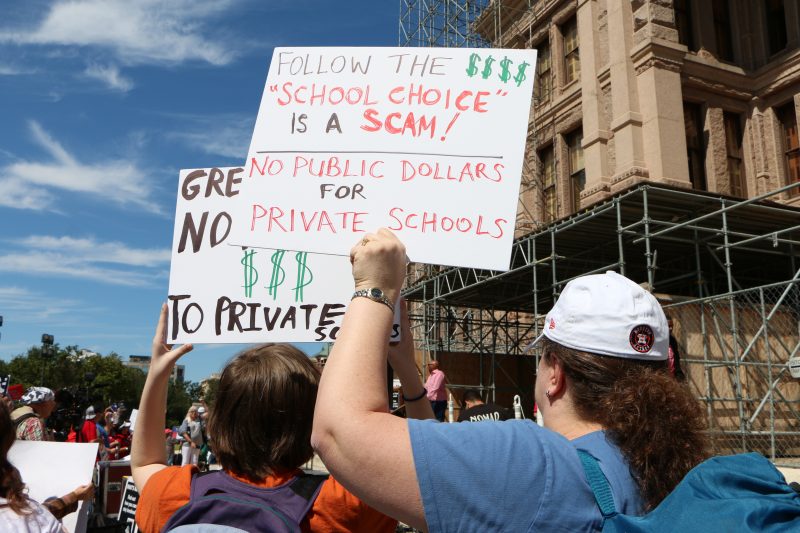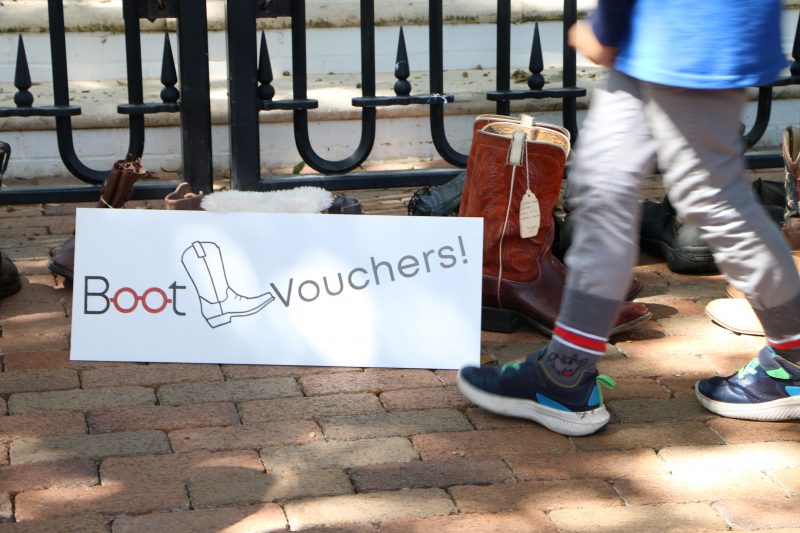Public Ed Advocates Want to Give Abbott’s School Choice Proposal the Boot(s)
By Abby L. Johnson
Reporting Texas

Protesters raise signs denouncing Gov. Greg Abbott’s proposed education savings account program at an anti-voucher rally at the Capitol. Abby L. Johnson/Reporting Texas
Thousands of people rallied with signs of protest and boots in hand at the Texas State Capitol on Saturday to protest a proposed voucher-like program they fear will take away significant funding from public schools.
After speeches from public education advocates, including educators, parents, students and clergy members, the crowd walked to the Governor’s Mansion to place their boots in front of the gates to symbolically “give vouchers the boot.”
Bishop John Ogletree, a longtime proponent of public schools who served five terms on the Cypress Fairbanks school board, said the voucher program could harm minority communities and students of lower socioeconomic status.
“The future is at stake,” he said. “To take taxpayer money to support private schools will be a whole other step in the dismantling of public schools. A lot is at stake.”
The rally on Saturday was organized by Texans for Public Education, a nonpartisan group of 40,000 public education advocates from across the state. It was sponsored by 30 other advocacy groups, and the gathering represented diverse voices of retired teachers, school nurses, librarians, activists, parents and students.
“I have grandchildren in the Texas public schools that will suffer at the hands of the Legislature if this educational savings account slash voucher issue gets any teeth,” said Judi Thomas, a retired teacher of 32 years.
She traveled over 100 miles from Conroe and held a sign that read, “Gov. Abbott wants to destroy Texas schools!! No vouchers in Texas!”
The rally took place just days before the third special session of the 88th Legislature was to begin Monday. Gov. Greg Abbott called for the special session after House Bill 100 failed to pass in this year’s regular session.
The bill would strengthen Abbott’s statewide school choice campaign by allowing parents to use taxpayer dollars to pay private school tuition.
The education savings account program is the first of six issues expected to be addressed during the special legislative session.
“Now is the time for Texas to deliver school choice, protect Texans and Americans against Biden’s border crisis, and ban all COVID vaccine mandates,”Abbott posted on social media last week, hinting at his priorities over the next 30 days.
In her speech, Tamey Williams-Hill, chief human capital officer of the Manor school district, quantified the potential impact of the bill. “We know that the state of Texas allots $6,160 for each student enrolled. With the voucher, school choice, education, education, savings account — whatever you choose to call it— one teacher, counselor or librarian can be cut for every seven to nine students who leave public education schools,” she said.
“Vouchers are a nuclear option,” said Troy Reynolds, founder of Texans for Public Education. “School systems generally don’t recover from them if they get passed.”
Reynolds was inspired to start the grassroots organization in 2011 when, as a first-time principal for the Splendora school district north of Houston, he was forced to lay off 15% of his staff due to budget cuts. He says the most “fragile” students will be affected most by vouchers, adding that every bill being presented with vouchers has a clause that says if a student takes a voucher, they sign away their special education rights guaranteed by the Texas Individuals with Disabilities Education Act.
“I think we should be focusing on bettering the education rather than creating vouchers,” said Zarqa Fathima, who recently graduated as valedictorian of Navarro Early College High School in Austin. “Because education is a right.”
Texans for Public Education promotes what it calls “block” voting, a play on bloc voting. It ranks state candidates as neutral, friendly or unfriendly to public education and votes together to block candidates it thinks would hurt Texas public education.
The speakers encouraged rally attendees to continue to make their objections known throughout the special session and beyond by contacting their representatives and by voting in every state election.

Attendees of the anti-voucher rally leave boots in front of the Governor’s Mansion to protest Gov. Greg Abbott’s education savings account proposal. Abby L. Johnson/Reporting Texas